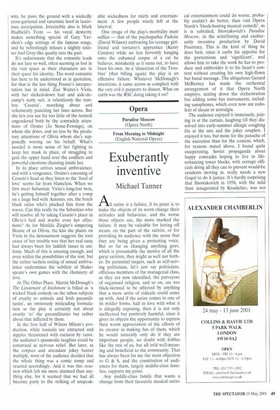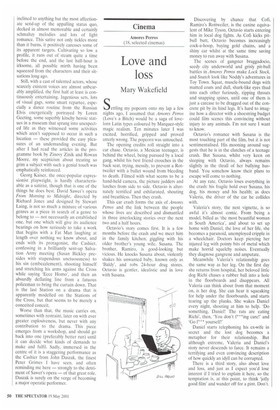Opera
Paradise Moscow (Opera North) From Morning to Midnight (English National Opera)
Exuberantly inventive
Michael Tanner
A, satire is a failure, if its point is to make the objects of its scorn change their attitudes and behaviour, and the worse those objects are, the more marked the failure. It may be valuable for letting off steam, on the part of the satirist, or for providing its audience with the sense that they are being given a protesting voice. But so far as changing anything goes, which is presumably the motive of all the great satirists, they might as well not bother. Its perennial targets, such as self-serving politicians, let's just say politicians, officious members of the managerial class, as they are now identified, the purveyors of organised religion, and so on, are too thick-skinned to be affected by anything that a mere artist of ridicule could come up with. And if the satire comes in one of its milder forms, half in love with what it is allegedly exposing, then it is not only ineffectual but positively harmful, since it gives its objects the opportunity to express their warm appreciation of the efforts of its creator in making fun of them, which he would naturally only do if they are important people, no doubt with foibles like the rest of us, but all told well-meaning and beneficial to the community. That has always been for me the main objection to G & S, and the constitution of audiences for them, largely middle-class families, supports my point.
Any middle-class family that wants a change from their favourite musical satiri cal entertainment could do worse, probably couldn't do better, than visit Opera North's 'block-busting musical comedy', as it is subtitled, Shostakovich's Paradise Moscow, in the scintillating and exuberantly inventive production by David Pountney. This is the kind of thing he does best, since it curbs his appetite for the pretentious and 'significant', and allows him to take the work he has to produce and embroider it to his heart's content without creating his own high-flown but banal message. The ubiquitous Gerard McBurney has made the orchestral arrangement of it that Opera North employs, scaling down the orchestration but adding some fun instruments, including saxophones, which even now are redolent of sleaze or nostalgia.
The audience enjoyed it immensely, joining in at the curtain, laughing till they dissolved into early-summer allergic coughing fits at the sets and the jokey couplets. I enjoyed it too, but more for the panache of the execution than for the content, which, for reasons stated above, I found quite exasperating. Soviet propaganda about happy comrades hoping to live in lifeenhancing tower blocks, with corrupt officials doing all they can to prevent would-be residents moving in, really needs a new Gogol to do it justice. It's hardly surprising that Shostakovich in 1958, with the mild thaw inaugurated by Krushchev, was not
inclined to anything but the most affectionate send-up of the appalling status quo, decked in almost memorable and certainly schmaltzy melodies and lots of light romance. This satire not only tickles more than it burns, it positively caresses some of its apparent targets. Cultivating so low a profile, it runs out of steam quite a time before the end, and the last half-hour is irksome, all possible mirth having been squeezed from the characters and their situations long ago.
Still, with a cast of talented actors, whose scarcely existent voices are almost unbearably amplified, the first half at least is continuously entertaining. Ingenious sets, lots of visual gags, some smart repartee, especially a dance routine from the Russian Elvis energetically portrayed by Loren Geeting, some superbly kitschy heroic statues in a museum that sprang into unexpected life as they witnessed some activities which aren't supposed to occur in such a location — these provided the easy pleasures of an undemanding evening. But after I had read the articles in the programme book by Zinovy Zinik and Rowan Moore, my scepticism about treating so grim a subject with such a genial touch was emphatically reinforced.
Georg Kaiser, the once-popular expressionist playwright, is hardly characterisable as a satirist, though that is one of the things he does best. David Sawer's opera From Morning to Midnight, directed by Richard Jones and designed by Stewart Laing, is not so much a mixture of various genres as a piece in search of a genre to belong to — not necessarily an established one, but one which will give its audience bearings on how seriously to take a work that begins with a Fat Man laughing at length over nothing we know about, and ends with its protagonist, the Cashier, confessing in a brilliantly sent-up Salvation Army meeting (Susan Bickley presides with stupendous unctuousness) to his sin (embezzlement), shooting himself and stretching his arms against the Cross while saying `Ecce Homo', and then an absurdly deflating line from a fatuous policeman to bring the curtain down. That is the last Station on a drama that is apparently modelled on the Stations of the Cross, but that seems to be merely a conceited conceit.
Worse than that, the music carries on, sometimes with restraint, later on with ever greater explosiveness, but never with any contribution to the drama. This piece emerges from a workshop, and should go back into one (preferably better run) until it can decide what kinds of demands to make and fulfil. Sadly, immersed in the centre of it is a staggering performance as the Cashier from John Daszak, the finest Peter Grimes I have seen, and often reminding me here — strongly to the detriment of Sawer's opera — of that great role. Daszak is surely on the verge of becoming a major operatic performer.



































































 Previous page
Previous page